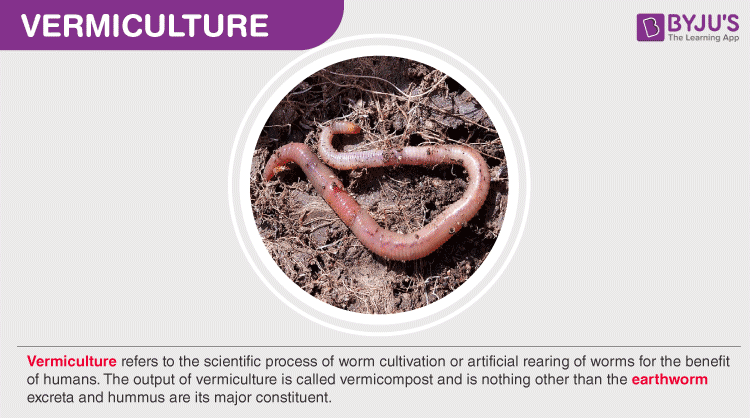Vermicomposting is an organic and biological process in which earthworm species are primarily used to convert organic matter or biodegradable wastes into manure. The produced vermicomposts are rich in nutrition and thus, they are widely used as bio fertilisers in organic farming and sewage treatment plants.

Compost mainly refers to the end products formed by the biodegradation of organic matter. Vermicompost refers to the end product developed by the degradation of organic matter.
Explore more: Vermicomposting
Vermicompost has many advantages compared to compost. Vermicompost can be produced in lesser spaces, smaller containers, and both indoors and outdoors.
Let us have a look at the applications of Vermicompost.
Applications of Vermicompost
Vermicomposting is environmentally friendly and is widely used in agriculture. These organic wastes contain organic carbon and plant nutrients in appreciable amounts.
- Vermicomposting can also be used as a technique for domestic wastewater management.
- Vermicompost can be used in organic farming and small scale sustainable farming.
- Vermicompost has several excellent properties and has many advantages when applied to the soil.
- Vermicompost is an excellent nutrient-rich organic fertiliser, which helps plants to grow well and give better yields.
- Adding vermicompost, which is rich in organic compounds, to the soil, plays a fundamental role in improving productivity.
- Vermicompost can also be used as a growth regulator as it contains all essential plant nutrients in appropriate proportions. Thus, it is complete and balanced plant food.
- Vermicompost is high in proteins and other essential nutrients. Therefore, it is also used as an alternative in aquaculture feed.
- Regular use of vermicompost extract promotes plant growth, keeps plants healthier and fights plant diseases.
Explore more: Biofertilizers
Significance of Vermicompost
- Vermicompost improves the recycling of soil.
- Vermicompost enriches the soil with microbes.
- In rural areas, the production of vermicompost can provide livelihood support to the unemployed.
- Vermicompost helps in improving soil texture, aeration and increases water retention capacity.
- Vermicompost acts as a soil conditioner and improves the biological, physical and chemical properties of the soil.
Vermicomposting is an eco-friendly process, which can be used in farms to grow vegetables, herbs, flowers, fruit and other commercial crops. It enhances the colour, flavour, smell, taste and quality of flowers, fruits, vegetables and foodgrains.
Explore more: Crop Production and Management
The above-mentioned points conclude this article about the applications of vermicompost.
Stay tuned to BYJU’S Biology and learn more in detail about vermicompost, its procedures and other exciting facts.
Comments